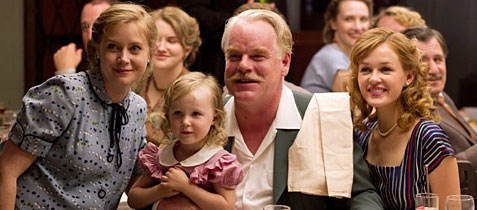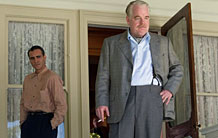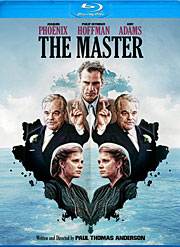- Rated R
- Drama
- 2012
- Buy the BD
All photos © Weinstein Co.
Reviewed by Ezra Stead
ive years after his brilliant oil industry pseudo-Western “There Will Be Blood,” writer-director Paul Thomas Anderson has finally released his most anticipated and contentious film to date. With rumors and denials of its depiction of the Church of Scientology abounding all through its long gestation period, “The Master” was bound to confound expectations, and that it certainly does. Before its release, I had speculated that if it doesn't win several Oscars, it will be because the Scientologists, who are well known to have a powerful influence in Hollywood, had suppressed it. Now that I've seen it, I am speculating on very different reasons for its possible eventual snubbing, namely that it is far too challenging and open-ended to be embraced by the Academy. Only time will tell.
“The Master” begins in a very unexpected way, and continues in that vein throughout. We are introduced to its protagonist, Freddie Quell (Joaquin Phoenix), telling a rather horrifying and bizarre joke about crab lice to his fellow Navy men on the beach during World War II. In an effective elliptical style that also continues throughout the film, we see Freddie helping to build a naked woman out of sand, then consummating his relationship with her in a rather comically grotesque way, and later making moonshine liquor out of torpedo fuel, which he is brazenly unafraid to drink straight from the source. Freddie's character is well established as an outcast who can't seem to fit in anywhere, and who seems to relish preventing this very possibility. It is unclear whether he was made this way by the horrors of war, or if war was just another venue for his already antisocial personality.

After drunkenly and violently quitting a job as a department store photographer, Freddie wanders aboard a yacht owned by Lancaster Dodd (Philip Seymour Hoffman), who describes himself as “a writer, a doctor, a nuclear physicist, a theoretical philosopher,” and more, before offering Freddie a place in his mysterious organization on the basis of Freddie's moonshine skills. Of course, he is also fascinated with the challenge Freddie presents, as Dodd's philosophy holds that humanity must regress from the animal state back to our original state of perfection, and few men more animalistic than Freddie have ever walked the earth. Freddie reciprocates Dodd's interest in him in a stunning scene in which he undergoes Dodd's “processing” technique (clearly inspired by Scientology's “auditing”), in which a series of rapid-fire, repetitive questions forces Freddie to dredge up his past traumas and his own feelings about them.
Freddie quickly appoints himself as a violent enforcer for Dodd and his movement, “The Cause,” to the decidedly mixed feelings of others within Dodd's close-knit community, such as his wife, Peggy (Amy Adams), and son, Val (Jesse Plemons). The relationship between Freddie and Dodd also undergoes many peaks and valleys, as Dodd works to redeem Freddie and bring him into the fold. The dynamic between these two fascinatingly similar men recalls the rivalry between Daniel Plainview and Eli Sunday in “There Will Be Blood,” though here the lines are much more blurred, and the two characters much more alike and sympathetic to one another. More than Plainview and Sunday, they are truly two sides of the same coin, an idea exemplified in a gorgeously shot scene in which they share opposite jail cells and very opposite reactions to this situation.
Shot in the currently underused 70-millimeter film format, “The Master” is a gorgeous film throughout, though never showy about it in the way that Anderson's earlier films (especially the excellent “Boogie Nights” and “Magnolia”) often were. The entire cast is in top form, and Phoenix delivers an astoundingly intense comeback performance after his stunt hiatus from acting, plumbing depths of aggression and vulnerability with consummate skill. Hoffman is also compelling as always in the role of a charlatan who is nevertheless wonderfully sympathetic and human.
In one of the film's most interesting scenes, a wealthy convert (Laura Dern) to The Cause questions Dodd about apparent contradictions in his philosophies, with disastrous results. This scene pointedly shows the difficulty in single-handedly creating a religion, and begs the question of whether the respected, ancient ones are only believed and followed because there is no one alive to answer for them. This is a film of huge ideas and unusual possibilities, the kind of movie that grows on you the more you think about it. My only real complaint is that a single viewing is not enough, and that's the kind of complaint any filmmaker worth his salt would love to hear.
Two-Disc Blu-ray Review:
Fans of Paul Thomas Anderson's latest film are going to be really disappointed with the Blu-ray release. There's no audio commentary, production featurettes, or anything of note apart from a 20-minute montage of outtakes and additional scenes, some random behind the scenes footage, and John Huston's 1946 documentary about WW2 vets, "Let There Be Light." Also included is a DVD and UltraViolet digital copy of the movie.
 |
 |
You can follow us on Twitter and Facebook for content updates. Also, sign up for our email list for weekly updates and check us out on Google+ as well.












